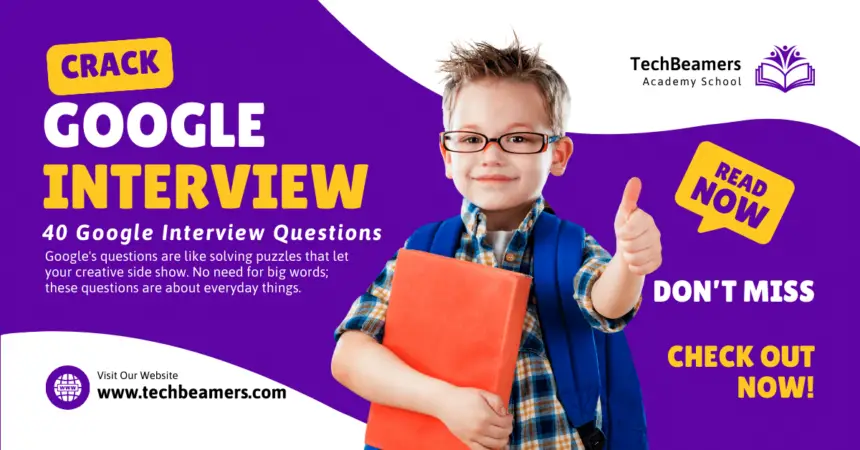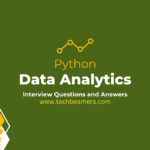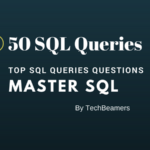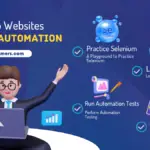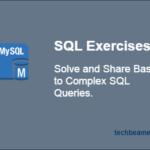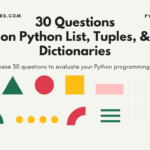Thinking about Google interviews? It’s like going on an adventure! Google’s questions are like solving puzzles that let your creative side show. No need for big words; these questions are about everyday things. From simple thinking to practical solutions, it’s a fun ride. Explore the world of Google interview questions—where it’s simple yet exciting—and see how anyone can figure out how to join Google’s awesome team. Ready for something that could change your job path? Let’s check it out together!
Must Read: Step-by-Step Guide to Cracking the Coding Interviews
The Best 40 Google Interview Questions and Answers
Here are the 40 sample interview questions that Google might ask during an interview. The questions are distributed in 4 categories. Each section has 10 questions, let’s start with the general part first. You’ll most probably face some of these during your initial conversation. It is important to understand and prepare the best you can. It is because these will set the stage for you.
General Google Interview Questions and Answers
Explore the general Google interview questions—think puzzles, not problems! From creativity to everyday smarts, it’s a journey where anyone can crack the code and join the Google team.
1. Why do you want to work at Google?
I love using technology to solve real problems, and I think Google is really good at coming up with new ideas. I’m especially interested in how Google uses artificial intelligence and machine learning to do cool things that can help the world. I also like that Google is all about working together and being creative. I think it’s a great place for me to learn and develop.
2. What do you know about Google’s history and culture?
Google was founded in 1998 by Larry Page and Sergey Brin while they were Ph.D. students at Stanford University. The company strives to “structure information worldwide, ensuring its universal accessibility and value.” Google has a long history of innovation, and it is responsible for some of the most popular and widely used products and services in the world. For example- Google Search, Gmail, YouTube, and Android. Google is also a leader in the field of artificial intelligence, and it is investing heavily in this area.
Google is known for its unique corporate culture, which is often described as being “Googley.” Some of the key aspects of Google’s culture include a focus on innovation, a commitment to open communication, and a belief in the power of data. Google also has a strong emphasis on employee well-being, and it offers a variety of perks and benefits to its employees.
3. What is your favorite Google product, and how would you improve it?
My favorite Google product is Google Search. It is an incredibly powerful tool that I use every day to learn new things and to stay informed about the world around me. I would improve Google Search by making it even more personalized and relevant to each individual user. I would also like to see Google Search become more proactive in providing information to users, even before they ask for it.
4. How does Google stand out from its competitors?
Google stands out from its competitors in a number of ways. First, Google is a leader in innovation. The company is constantly developing new products and services, and it is always looking for new ways to improve its existing products. Second, Google has a strong focus on user experience. The company’s products are designed to be easy to use and accessible to everyone. Third, Google has a vast amount of data that it can use to improve its products and services. The company is able to collect and analyze data from its users in order to learn more about their needs and preferences.
5. What are your strengths and weaknesses?
My strengths include my ability to learn new things quickly, my ability to work independently, and my ability to think creatively. My weaknesses include my tendency to procrastinate and my occasional difficulty in communicating my ideas effectively.
6. Tell me about a time you had to deal with a difficult customer or colleague.
I once had a customer who was very demanding and difficult to please. I was able to deal with this customer by staying calm and professional, and by always trying to understand their point of view. Furthermore, I was also able to resolve the issue to the customer’s satisfaction.
7. How do you handle pressure and deadlines?
I handle pressure and deadlines by staying organized and focused. I break down large tasks into smaller, more manageable tasks, and I set realistic deadlines for myself. In addition, I also make sure to communicate with my manager and colleagues if I am feeling overwhelmed or if I need assistance.
8. What are your career goals?
My career goal is to be a leader in the field of artificial intelligence. I want to use my skills and knowledge to develop new technologies that can solve real-world problems. I also want to mentor and inspire other young people who are interested in pursuing a career in artificial intelligence.
9. Why are you interested in this particular position?
I am interested in this particular position because it would allow me to use my skills and knowledge to make a real impact on the company. I am also interested in working with the team that is responsible for developing this product, as I believe that they are some of the most talented and innovative engineers in the industry.
10. What do you know about the team you would be working on?
I know that the team is made up of highly skilled and experienced engineers. I am also aware that the team is very passionate about the product they are developing. Certainly, I believe that I would be a valuable asset to the team, and I am excited to learn from them and to contribute to their success.
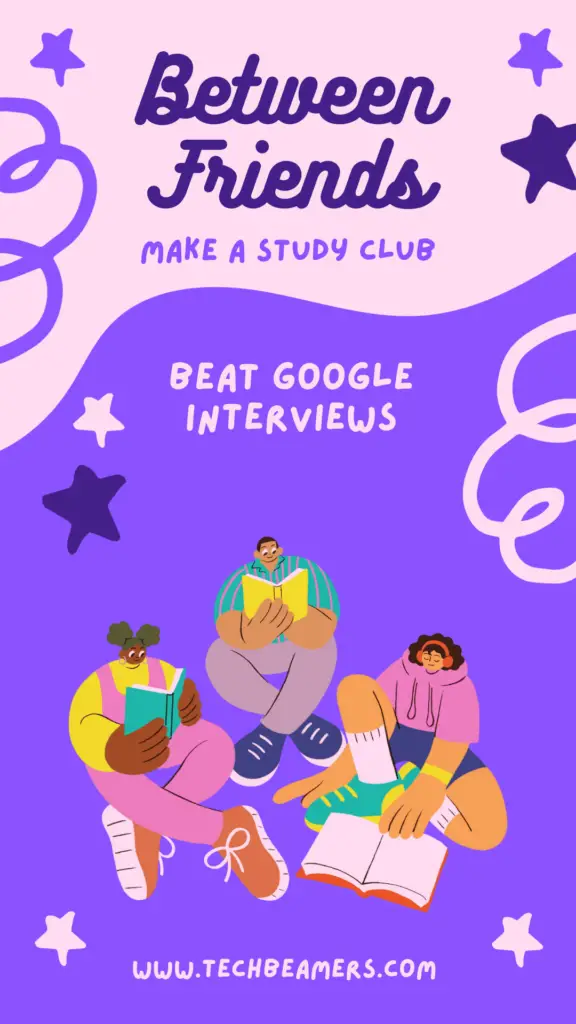
Technical Questions and Answers
Dive into technical Google interview questions—it’s like unlocking a puzzle for problem solvers! From coding challenges to real-world scenarios, it’s where tech enthusiasts showcase their skills to join Google’s innovative crew.
1. Explain the difference between a linked list and an array.
Picture an array as a row of neatly aligned boxes, each filled with similar items. These boxes sit right next to each other in memory, and their addresses form a consecutive sequence.
On the other hand, envision linked lists as a series of connected boxes. Each box, known as a node, has a link to the next one. This arrangement allows the boxes to be spread out across memory, and their addresses don’t follow a specific order. It’s like a chain of information, more flexible in how it’s organized.
2. What is the time complexity of binary search?
The time complexity of binary search is O(log n), where n is the number of elements in the array being searched. This means that the time it takes to perform a binary search is proportional to the logarithm of the number of elements in the array. This makes binary search a very efficient search algorithm, especially for large arrays.
3. Write a function to reverse a linked list.
Here is a function to reverse a linked list:
def reverse_list(head):
prev = None
current = head
while current:
next = current.next
current.next = prev
prev = current
current = next
head = prev
return head
4. What is the difference between a hash table and a tree?
A hash table is a data structure that maps keys to values. It uses a hash function to convert keys into memory addresses, which allows for a very fast lookup of values. Trees, on the other hand, are hierarchical data structures that consist of nodes. Each node can have zero or more child nodes. Trees are often used to represent hierarchical relationships, such as parent-child relationships.
5. Explain the concept of object-oriented programming.
Object-oriented programming (OOP) is a programming paradigm that organizes code around objects rather than functions and procedures. Objects are instances of a class, which is a blueprint for creating objects. Classes have attributes, which are variables that store data, and methods, which are functions that operate on data. OOP allows for code reuse and modularity, making it a popular programming paradigm for large-scale software development.
6. Write a function to find the largest element in an array.
Here is a function to find the largest element in an array:
def find_largest(array):
largest = array[0]
for i in range(1, len(array)):
if array[i] > largest:
largest = array[i]
return largest
7. What is the difference between a compiler and an interpreter?
A compiler transforms a whole program from one language to another before it runs. The outcome, called machine code, can be directly carried out by the computer’s processor. Conversely, an interpreter translates and runs a program line by line. This implies that the interpreter needs to be there while the program is running.
8. Explain the difference between a class and an object.
A class is a blueprint for creating objects. It defines the attributes and methods that objects of that class will have. An object is an instance of a class. It has the attributes and methods defined by its class.
9. Write a function to print the Fibonacci sequence.
Here is a function to print the Fibonacci sequence:
def fibonacci(n):
if n == 0:
return 0
elif n == 1:
return 1
else:
return fibonacci(n - 1) + fibonacci(n - 2)
10. What is the difference between a static and a dynamic variable?
A function declares a static variable, not tied to any specific object, initializing it only once when the function is first used. In contrast, a dynamic variable, allocated memory during runtime, typically receives memory on the stack or the heap.
Behavioral Google Interview Questions and Answers
Delve into behavioral Google interview questions—it’s like sharing your story and how you tackle challenges! From teamwork to overcoming obstacles, it’s where your experiences shine to become a valued member of Google’s dynamic and creative team.
1. Tell me about a time you had to come up with a creative solution to a problem.
I once was working on a project that required me to design a new algorithm for a large-scale data processing task. The existing algorithms were not efficient enough to handle the amount of data we were dealing with, and I was struggling to come up with a new solution. I eventually decided to take a different approach to the problem, and I was able to develop an algorithm that was significantly more efficient than the existing ones.
2. Describe a time you had to lead a team to achieve a goal.
I was once the project manager for a team of engineers who were tasked with developing a new software application. The project was very complex and had a tight deadline, but I was able to successfully lead the team to achieve our goals. I kept everyone on track, motivated, and focused, and I was able to resolve any conflicts that arose.
3. How do you deal with setbacks and failures?
I deal with setbacks and failures by learning from them and moving on. I try to identify what went wrong and how I can avoid making the same mistake in the future. Side-by-side, I also try to stay positive and focus on my goals.
4. Tell me about a time you had to work under pressure.
I once had to meet a very tight deadline for a project that I was working on. I was feeling very stressed and overwhelmed, but I was able to manage my time effectively and get the project done on time. Finally, I learned the importance of staying organized and focused under pressure.
5. How do you handle conflict?
I handle conflict by trying to understand the other person’s point of view and finding a solution that works for everyone. I am also willing to compromise and make concessions.
6. Give an example of a time you went above and beyond in your job.
I once volunteered to help out with a project that was not part of my job description. I was able to use my skills and knowledge to help the team succeed, and I was very proud of my contribution.
7. What is your motivation for working hard?
I am motivated by the challenge of learning new things and solving difficult problems. I also enjoy the feeling of accomplishment that comes from completing a task or project.
8. How do you stay organized and manage your time effectively?
I use a variety of tools and techniques to stay organized and manage my time effectively. I create to-do lists, set deadlines, and use time management software. Moreover, I also try to break down large tasks into smaller, more manageable ones.
9. What are your biggest accomplishments?
One of my biggest accomplishments is developing a new algorithm that significantly improved the efficiency of a large-scale data processing task. I am also proud of leading a team of engineers to successfully develop a complex software application.
10. What are your learning goals?
I am always learning new things. I am currently learning about artificial intelligence and machine learning. Next, I am also interested in learning more about leadership and management.
We hope these answers are helpful. Please let us know if you have any other questions.
Additional Google Interview Questions and Answers
Check out more Google interview questions—it’s like an extra peek into your skills and who you are! From solving problems to what you love doing, it’s where you share a bit more to fit in with Google’s cool and creative crew.
1. What is your favorite programming language, and why?
My favorite programming language is Python. I find it to be a very versatile and easy-to-learn language. It has a large and active community, which makes it easy to find help and resources. Python is also a good choice for a wide variety of tasks, including web development, data science, and machine learning.
2. What are you passionate about outside of work?
I have a strong enthusiasm for acquiring new knowledge. I find pleasure in reading, participating in classes, and engaging in workshops. Additionally, I am deeply passionate about traveling and immersing myself in diverse cultures.
3. What do you think is the most important quality for a software engineer to have?
I think the most important quality for a software engineer to have is problem-solving skills. Software engineers need to be able to identify and solve problems in a creative and efficient way. They also need to be able to think critically and come up with innovative solutions.
4. What are your thoughts on the future of artificial intelligence?
I hold the belief that artificial intelligence carries the potential to transform various facets of our existence. I am eager to witness the ways in which AI can enhance healthcare, transportation, and education. While recognizing the potential drawbacks, such as job displacement and algorithmic bias, I emphasize the significance of developing AI in a responsible and ethical manner.
5. What is your favorite thing about technology?
I love how technology can connect people from all over the world. It makes it possible to share ideas, learn from each other, and build relationships. Technology has also made it possible to solve some of the world’s most pressing problems, such as poverty and hunger.
6. What is your favorite project you have worked on?
I am most proud of the work I did in developing a new algorithm for large-scale data processing. This project was very challenging, but it was also very rewarding. I was able to use my skills and knowledge to develop a solution that had a significant impact on the company.
7. What is your approach to learning new things?
I believe the most effective approach to learning is through practical experience. Experimenting with new things and observing the outcomes is something I enjoy. Reading books and articles on subjects of interest is another method I use. Additionally, I find it beneficial to engage in conversations with experts in the field.
8. What is your dream job?
My dream job is to be a professor of computer science. I would love to teach and mentor students and help them reach their full potential. I would also love to conduct research and develop new technologies.
9. What do you think is the biggest challenge facing Google today?
I think the biggest challenge facing Google today is competition from other tech giants, such as Amazon and Microsoft. These companies are all investing heavily in artificial intelligence and other cutting-edge technologies, and they are all vying for the same customers. Google will need to continue to innovate and adapt in order to stay ahead of the competition.
10. What do you think is the future of Google?
I believe that Google has a very bright future. The company is always innovating and coming up with new products and services. I believe that Google will continue to be a leader in the tech industry for many years to come.
These are just a few examples of the types of questions that Google might ask during an interview. The specific questions you will be asked will vary depending on the position you are interviewing for. However, by preparing for a variety of questions, you can increase your chances of success.
Conclusion
You’re on your way to rocking Google interviews! Treat each question as a chance to show your strengths and problem-solving skills. Enjoy the process, share your experiences, and let your passion shine. It’s not just about getting the right answers but showing how you think. Stay confident, stay curious, and trust in your ability to handle challenges. Google is after folks with different ideas, and you’ve got what they’re looking for! Keep practicing, be yourself, and you’ll handle Google interviews like a champ. Good luck on this exciting journey!

